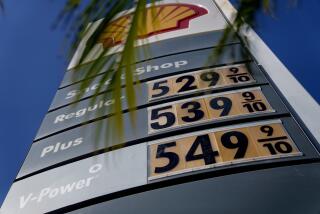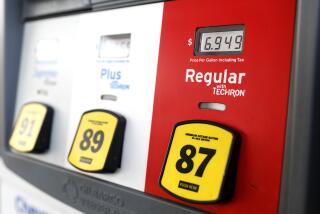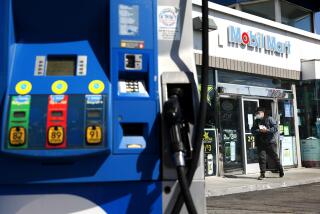Letters: Follow the gas money
Re “Gas market’s structure hits drivers hard,” Oct. 22
The graph that accompanied this article, which shows how crude oil prices, taxes, refiners and station owners have influenced the price of gas recently, proves that
practically all of the recent run-up in California gasoline prices is going to the refinery owners: Chevron, Tesoro, BP, ConocoPhillips, Exxon Mobil and four others. Chevron, BP, Exxon Mobil and ConocoPhillips are, along with Shell, the five largest oil companies in the world, and in 2011 they made record profits of $137 billion.
Since only one segment of the gasoline supply chain is profiting from this price run-up, it is hard to believe that this segment is not also solely responsible. The oil companies say they are not actively colluding to set prices; since they aren’t, they have apparently developed some other price-gouging method that is just as effective and just as destructive to the economy.
Every time an oil severance tax has come up for consideration in California, the oil companies have warned that that would raise gas prices. Turns out that gas prices are going to go up anyway, but at the oil companies’ convenience. At least if we pass an oil severance tax, we will get something out of it, just like the socialist states of Alaska, Texas and Oklahoma.
Jim Cody
North Hollywood
Thank you for noting that California is a closed gasoline market because of government regulation, stopping competition. Maybe we ought to get rid of government involvement and let the consumer decide which product to buy.
Thank you also for showing that taxes accounted for 66 cents of the price of a gallon of gas on Oct. 8, while the retailers’ cut was only 21 cents, out of which the station owners must pay wages, healthcare and taxes along with having to comply with government regulations.
Government is the problem, and the business owner suffers along with the consumer, who does not have the choices a free market would offer.
Those who argue that the oil industry would damage the environment without heavy regulation take for granted that consumers don’t care about pollution. Believe me, we do.
Rich Case
Thousand Oaks
Having oil companies blame environment standards for high gasoline prices is like hearing a thief complain that the new lock on your door is the reason he had to break the window. Mismanaged refineries, frenzied futures trading and an oligopoly are what drive up the cost of gasoline in California.
Environmental protection laws that require more alternative fuels and cars protect us from the oil companies by giving consumers a choice.
One day I won’t have to send my dollars to huge oil conglomerates if I don’t feel like it.
Brooke Staton
Los Angeles
The answer to the question asked by the gas station owners at the end of your report — “Why did this happen?” — is described in detail within the article: The draconian standards demanded by California’s environmental regulations have created the oligopoly that is able to drive up prices, and it will only get worse.
The question that the people of California need to ask is whether these regulations are producing a benefit to us that is worth destroying the state’s economy. I submit they are not.
Flora Plumb Johnson
Los Angeles
ALSO:
Postscript: Why do endorsements?
Letters: Isolationism’s consequences
Letters: Give California voters some credit
More to Read
A cure for the common opinion
Get thought-provoking perspectives with our weekly newsletter.
You may occasionally receive promotional content from the Los Angeles Times.






